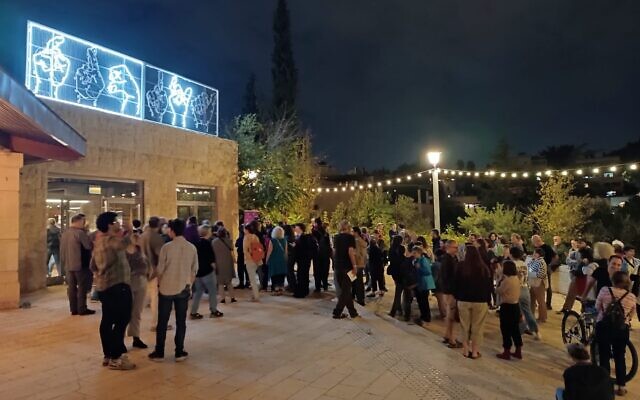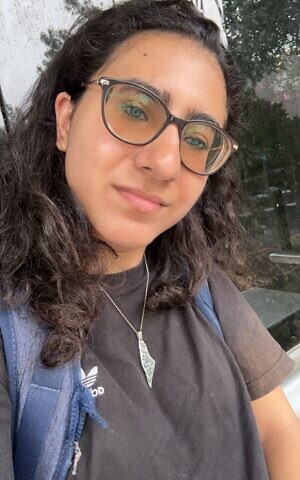Nearly 400 people gathered on Monday night in the Jerusalem neighborhood of Abu Tor for Jewish-Arab solidarity and coexistence amid the ongoing war between Israel and terror group Hamas in the Gaza Strip.
Organized by Standing Together, a grassroots movement whose goal is to “mobilize Jewish and Palestinian citizens of Israel in pursuit of peace and equality,” the meeting is the fifth in a series of get-togethers throughout Israel to raise a common voice “to end the death and violence,” in the words of the group’s co-director Alon-Lee Green.
The event was initially scheduled to take place in a Reform synagogue in the city, but had to be moved to a different location following opposition by the Jerusalem Municipality, which owns the synagogue’s premises. The municipality confirmed that the event was not held at the designated location due to its political nature.
On Sunday, a day before the event, the organizers turned to FeelBeit, a cultural center and cafe managed jointly by a diverse community of Israeli and Palestinian Jerusalemites, which regularly hosts art and music events and even received an impromptu visit by US Secretary of State Anthony Blinken earlier this year. Unaccustomed to hosting such large crowds, the center, whose name means “at home” in Arabic, was forced to open an overflow room next to the main conference hall.
The evening started with speeches by a pair of activists, one Israeli and one Palestinian.
“We didn’t want to be here tonight,” said Shir Nehamkin before the audience, which was composed predominantly of Jews, “but this meeting has been imposed upon us by the horrors of Hamas – and by extremist elements in Israeli society.”
This is happening is Jerusalem right now! Hundreds of Jewish and Arab-Palestinian citizens of Israel came together to a solidarity rally to say that only Israeli-Palestinian peace will end the death and violence. Only ending the occupation will bring life. Only partnership wins. pic.twitter.com/gK0WmYNnMX
— Alon-Lee Green – ألون-لي جرين – אלון-לי גרין ???? (@AlonLeeGreen) November 13, 2023
“There are people who incite violence against Palestinians in Israel to deepen the rift between us and them, and fan the flames of suspicion and hate. We cannot let that happen. These are the same people that keep promising us a messianic vision of occupation, Jewish supremacy, and by that take away our security.”
Co-speaker Aya Khatib, who talked in both Hebrew and Arabic, noted efforts by the organization to collect donations for families affected by the conflict in southern Israel in both Jewish and Bedouin communities, to visit injured people in hospitals, and to escort Arab students and workers afraid of possible street assaults by far-right extremists as they go to their places of study or work.
The introductory speeches were followed by an intervention by Rula Daood, Palestinian co-director of the organization on the national level, who emphasized the importance of community and mutual support in the current circumstances.
“Even if one day I am arrested, or my voice is silenced, I know I am part of a collective, and someone will stand up for me,” Daoud said, mentioning the fact that several Arab Israelis have been detained since the start of the war for posts published on social media.
“We need leaders who can take brave steps, and allow Arabs and Jews to live here in peace, security and equality,” Daoud continued. “Two peoples live on this land, and neither one of them is going to leave.”

People lining up to enter the FeelBeit cultural center in Abu Tor, Jerusalem, to attend a conference on Jewish-Arab coexistence, November 13, 2023 (Gianluca Pacchiani / Times of Israel)
Mossi Raz, a former Knesset member for the left-wing Meretz party, took the floor and called for a repeal of the nation-state law, asserting that it discriminates against Arab citizens of Israel, and noted that several Arabs and Bedouins were among the victims and the abducted on October 7, when 3,000 Hamas and other terrorists massacred 1,200 people in southern Israel and took over 240 hostages.
After the speeches, participants split into groups to discuss how to strengthen Arab-Jewish partnership and give people hope, highlighting the need to find community amid the constant flow of bad news, and the solace that comes from meeting people with similar values.
Omer Schwartz, a 39-year-old filmmaker, said he attended the meeting in order to “get out of the house, hear new ideas, and contribute to the moderate component of our society,” as well as “find a sense of security, tamp down the fear, and restore faith in humanity.”
Liat Adva, a 29-year-old New Jersey native who has lived in Israel since 2017, said that she and her husband Reuven have been involved in coexistence groups for Jews and Arabs for years. “Those are the values that we have. We are just trying to do things to live those values and keep feeling like we have community, and keeping ourselves sane during these times,” Adva said.
Commenting on how ties between the two communities have evolved after October 7, she continued: “It would be naive to say that there is not a strain in relations, because I know that we are getting different news, we are seeing different things and we are coming from different places. But I think that we need to focus on things that bring us together, and stick to our commitment to humanity and to seeing the other.”
Khatib, one of the speakers and organizers of the event, also commented on the importance of preserving ties between the communities. “After the outbreak of the war, Jews and Arabs started a new battle to determine who to blame for the conflict. Therefore, it’s important to stay united and bring out the human side in us.”

Aya Khatib, a student at Hebrew University and a social activist with the Standing Together movement, Jerusalem, July 2023 (courtesy)
Commenting on the low turnout by Jerusalem Palestinians, especially if compared to similar coexistence events the organization held in other cities in Israel over the past weeks, Khatib said: “As an Arab, I can understand the fear of my people to come to events like this. They are being persecuted for feeling bad for the victims in Gaza. My parents also didn’t want me to come tonight, because they are afraid that I may be subjected to harassment and stalking. It’s not easy, but I guess it will never be easy. Anyway, giving up is not the answer.
“I am disappointed that our government shuts down our voices, instead of listening to us,” Khatib added. “All we ask for is peace and safety. When the municipality canceled the event, I think it made Arabs even more scared.”
“We are aware how important it is for people to meet now,” said Zuhdi Najeeb, one of the Palestinian managers of the cultural center that hosted the event. “We are almost sure that there is no place like FeelBeit that can host such shared meetings in Jerusalem at this time.”
Uri Kaplan, a 32-year-old teacher and a veteran left-wing activist, said that improving relations between Jews and Arabs in Israel is a precondition for a better reality in the country. “I talk a lot about politics with my Arab and Jewish friends, to the point of exhaustion, but it’s inevitable. I even tried to organize a gathering at my place last week, but people from East Jerusalem canceled because they were afraid to leave the house.”
“My right-wing friends would probably not come to a meeting like this,” Kaplan added, noting that peace gatherings in Israel often tend to attract the same crowd of left-wingers, and preach to the choir. “If we want to have a bigger impact, we should think about how to attract a broader audience – at the end of the day it’s a marketing problem,” Kaplan reflected.
“I know it’s a cliché to say that we cannot lose hope, but at least by coming here we have the illusion that we are doing something,” he added. “We feel that we are not alone.”
"gather" - Google News
November 13, 2023 at 03:00PM
https://ift.tt/3KngIs8
Hundreds gather in Jerusalem to raise voice for Jewish-Arab solidarity - The Times of Israel
"gather" - Google News
https://ift.tt/NadK1Lh
https://ift.tt/SqjNUzp
Bagikan Berita Ini














0 Response to "Hundreds gather in Jerusalem to raise voice for Jewish-Arab solidarity - The Times of Israel"
Post a Comment